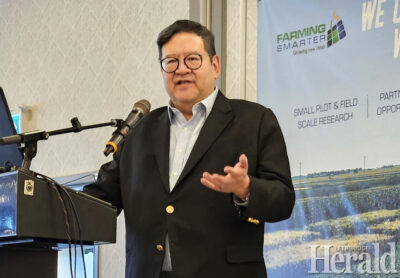Farmers playing a global role amid looming tariff war
By Lethbridge Herald on February 12, 2025.
 Gary Mar, president and CEO for the Canada West Foundation and former MLA and cabinet minister, speaks during the Farming Smarter Conference on Wednesday at the Sandman Signature Lodge.
Southern Alberta Newspapers photo by Kristine Jean
Gary Mar, president and CEO for the Canada West Foundation and former MLA and cabinet minister, speaks during the Farming Smarter Conference on Wednesday at the Sandman Signature Lodge.
Southern Alberta Newspapers photo by Kristine JeanKristine Jean – SOUTHERN ALBERTA NEWSPAPERS – ssnews@sunnysouthnews.com
Being resilient and realizing Canada’s important role as a net food exporter was part of a message shared by keynote speaker Gary Mar at the 2025 Farming Smarter Conference and Trade Show this week in Lethbridge.
On day one of the two-day annual conference Wednesday, Mar spoke about the pending U.S. tariffs, including those on Canadian steel and aluminum and shared his views on president Trump and trade policy, along with some of his thoughts on the soon-to-be tariff situation facing Canadians.
Mar is president and CEO for the Canada West Foundation, is a former MLA and cabinet minister and has worked as an independent consultant for both Chinese and Canadian companies regarding trans Pacific trade and investment. He served as the official representative of the province of Alberta at the Canadian Embassy in Washington D.C. (2007-2011) and was the province of Alberta’s representative in Asia (2011-2015). In 2022, Mar was appointed as a member and chair of the Council of Alberta Order of Excellence.
During his presentation, Mar shared three observations about tariffs and trade, including that “trade agreements are not protecting us from the malicious actions of others,” and that such threats come not only from our closest trade partners but from far away as well.
“The question is, what if anything, have we done to protect Canadian producers,” said Mar.
In a recent meeting with the former director of the United Nations Food Program, Mar pointed out that very few countries in the world are net food exporters while several countries are net importers and many of them are “teetering on the edge.”
“He predicted that within the next 24 months there could be a dozen or more countries that start to experience death by starvation,” said Mar. “So this is the reason why I’m very optimistic that Canada can be a very important player in the world, but we have to be resilient. We have to be able to figure out not only how we access markets, but how we survive markets in this “vuca” (vilotile, uncertain, complex and ambiguous) environment …and the trade world today is a vuca environment,” he added. “So we have to figure out how we’re going to survive in a vuca world.
“I think Canadian agriculture has been resilient in the past because the fundamental thing that you have is essential for human beings – food … we have something very important.”
Mar said Canada should be focusing on its role in the world and pointed to the example of the federal government’s attempt at reducing greenhouse gas emissions (GHG) associated with fertilizer by 30 per cent by 2030.
“Canada should be a leader in making the world safer, more secure and greener and the way we do that is with four things – food, fuel, fertilizer, forestry – and the world has demands for all that we produce in this country,” he explained, adding agricultural technologies was another important focus. “We are leaders in this area and we can make the world greener by our natural gas going to places to replace coal and that would have a dramatic reduction in the world’s GHG’s.”
Mar noted Alberta premier Danielle Smith’s approach to dealing with the United States is on the right track – using diplomacy, reaching out and building relationships with “those whose interests are the same as ours, is important” he said, noting communication is also key.
“Ag producers here have to be deeply embedded with their customers, whether it’s in the United States or elsewhere,” said Mar. “We’ve got to build longer, deeper relationships between provinces and states and (between) premiers and governors.”
14-13



I predicated that Mar would mention Danielle. Mar plays a part in UCP propoganda and his great Canada West Foundation does too.
Water. Water and Coal Mining in the headwaters, drought and lack of water.
These topics determine the immediate fortune of the farming and agri-industry that he was addressing and lauding the merits of our Premier.
Yet these topics were not even mentioned.